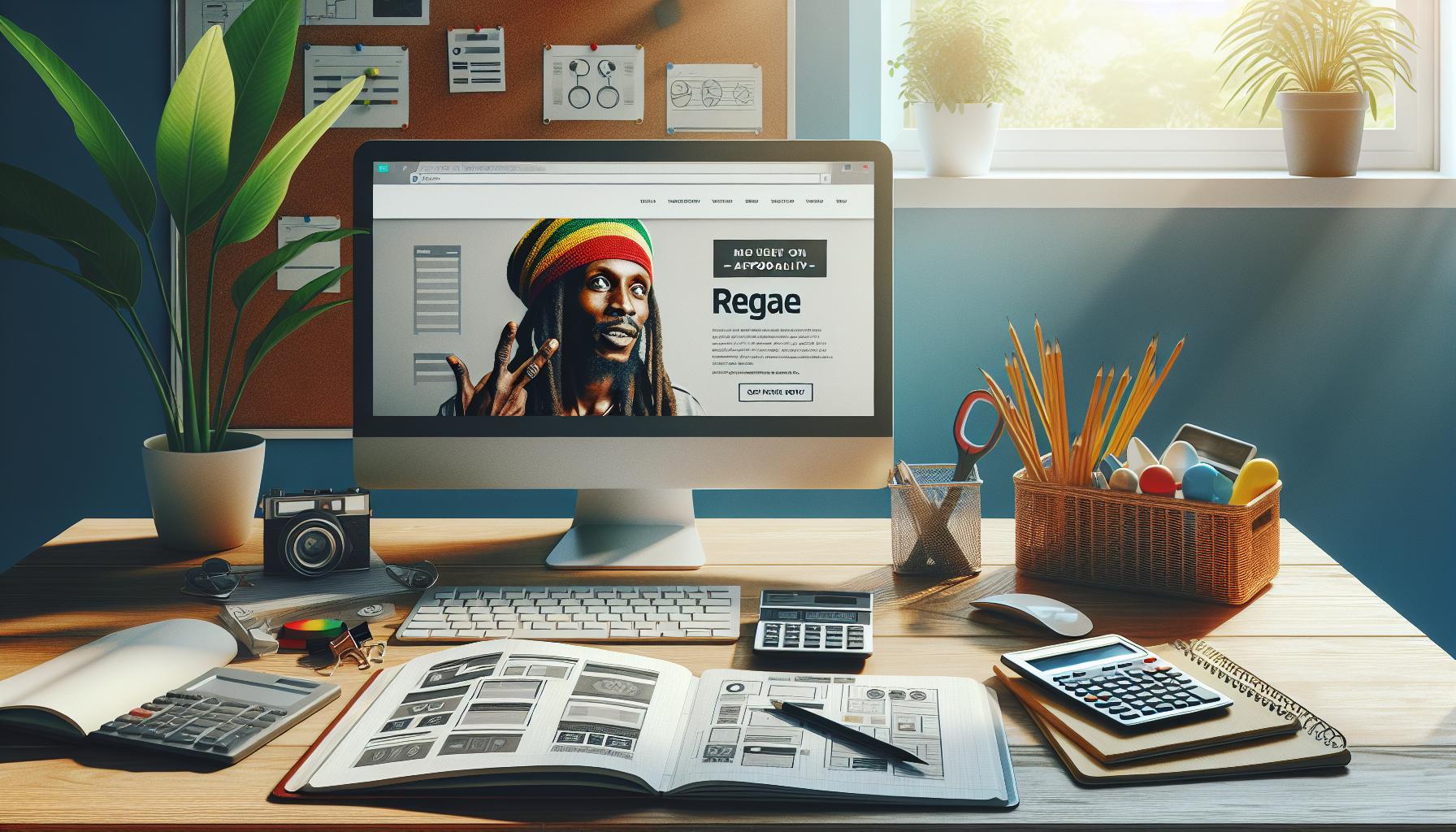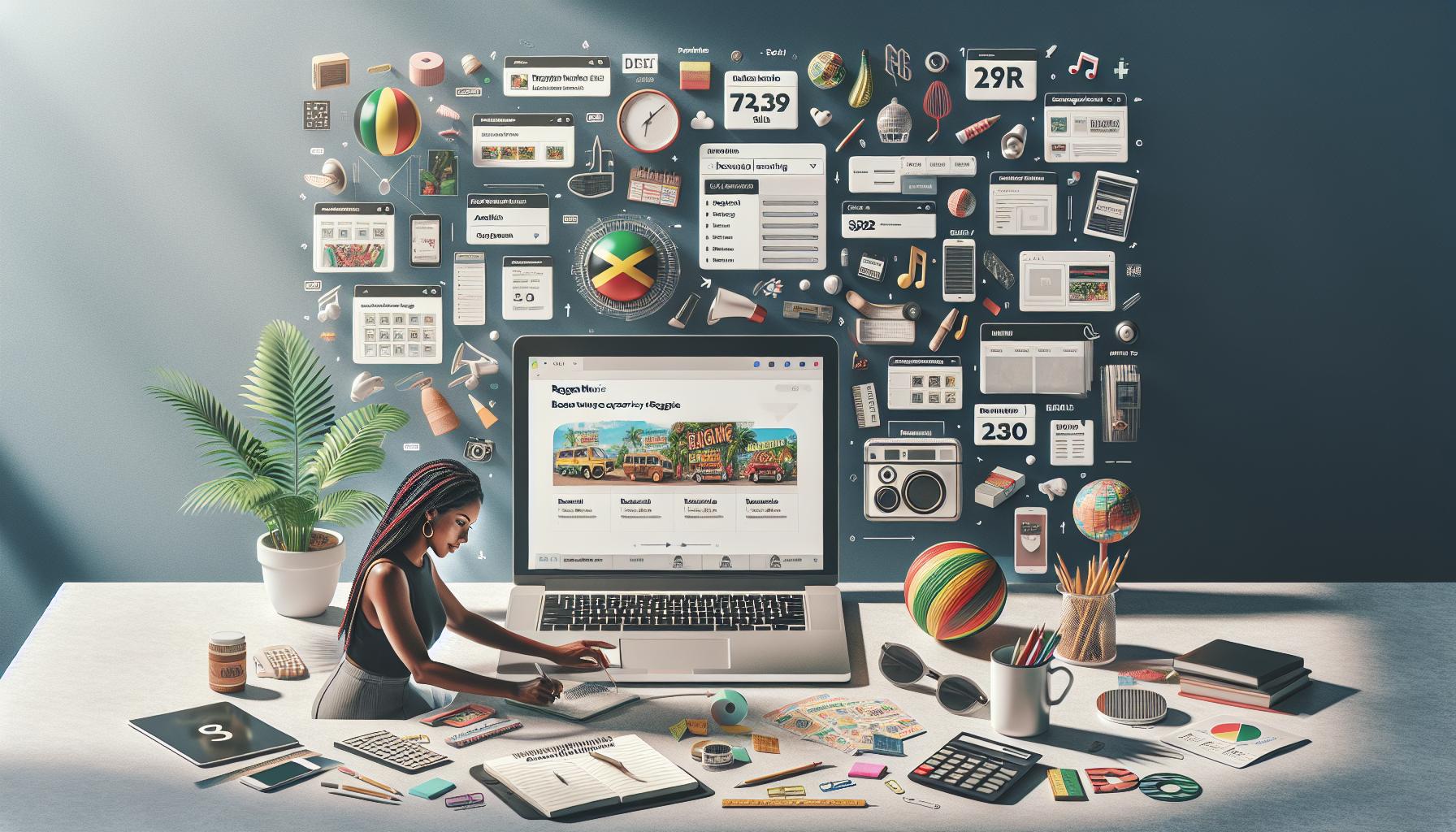jamaica Reggae and Rastafarian Music of Bob Marley on a Budget: The soundtrack to Your Life Without the Price Tag
Are you ready to immerse yourself in the vibrant rhythms of Jamaica Reggae and Rastafarian music, all while keeping your wallet happy? Look no further! In this article, Jamaica Reggae and Rastafarian Music of Bob Marley on a Budget, we’ll guide you through the epic sounds of a musical legend without breaking the bank. Picture this: you, a cold coconut drink in hand, bobbing your head to the beat of “Three Little Birds” — all for less than your favorite takeout meal! join us as we unveil the best ways to celebrate Bob Marley’s timeless tunes, from thrift store vinyl hunts to savvy streaming tips.Trust us, you don’t have to be a millionaire to soak up those iconic vibes. Let’s dive into the groove of Jamaica, where the only thing you need to budget for is your next dance party!
Jamaican Reggae: An Overview of Its Cultural Significance
Originating in the vibrant heart of Jamaica during the late 1960s, reggae music is a powerful reflection of the island’s tumultuous social and political landscape. The genre is more than just a musical style; it embodies the struggles, aspirations, and unique culture of the Jamaican people. With its signature offbeat rhythms,reggae has transcended geographic and cultural boundaries,resonating deeply with audiences around the world. This global reach is particularly evident through the works of iconic artists like Bob Marley, whose music encapsulates the essence of Rastafarian ideals, emphasizing themes of love, unity, and social justice.
One of the most profound aspects of reggae lies in its connection to Rastafarianism,a spiritual and cultural movement that emerged alongside the genre. This relationship imbues reggae with a rich tapestry of symbolism and deeper meanings.Key components of this cultural significance include:
- Religious Influences: Reggae serves as a vehicle for the expression of Rastafarian beliefs, promoting messages centered around faith, resistance, and hope.
- Political Commentary: Many reggae songs address social inequities, government corruption, and the struggle for freedom, echoing the voices of the marginalized.
- Cultural Identity: Reggae music fosters a sense of pride and belonging among Jamaicans and those who associate with its message, reinforcing a unique cultural identity.
- Global Resonance: The infectious rhythms and poignant lyrics have sparked movements across the globe, fostering solidarity and awareness for various social issues.
In the realm of musical genres, reggae stands as a powerful testament to the resilience of a people. It provides not only artistic expression but also a platform for communal dialog. By engaging with reggae, listeners gain insights into Jamaica’s cultural heritage and the indomitable spirit of its people. As Bob Marley once articulated, “One good thing about music, when it hits you, you feel no pain.” This sentiment encapsulates why reggae and Rastafarian music continue to hold lasting significance, making it accessible and relatable, even on a budget.
Understanding Rastafarian Influences in Bob marleys Music
Bob Marley’s music serves as a powerful vessel for the philosophical and spiritual tenets of rastafarian culture. Central to this genre of reggae, Rastafarianism imbues Marley’s lyrics with profound messages that promote peace, love, and social justice, while also addressing issues of oppression and the struggle against colonialism. Through his music, Marley not only entertained but also educated listeners about the struggles faced by the marginalized in society.
Key elements of Rastafarian influences in Marley’s work include:
- Spirituality: many songs reflect themes of faith, connection to Jah (God), and the importance of community.
- Social Commentary: Lyrics often critique political systems and systemic inequality, encouraging listeners to stand up against injustice.
- Heritage and Identity: Marley’s music frequently references the African diaspora, celebrating cultural identity and ancestral roots.
to better illustrate these influences, here’s a brief overview of some of Bob Marley’s most meaningful songs and their Rastafarian themes:
| Song Title | Themes and Messages |
|---|---|
| Redemption Song | A call for freedom from mental slavery and empowerment through self-awareness. |
| One Love | Promotes unity and peace among humanity, emphasizing a collective consciousness. |
| Get Up, Stand Up | Encourages people to fight for their rights, highlighting social and political activism. |
Marley’s fusion of reggae and rastafarian principles creates a unique sound that resonates with audiences worldwide. His music stands as a testament to the power of art as a medium for change, making Rastafarian culture accessible and relevant to listeners beyond Jamaican borders.
Exploring the Essential bob Marley Albums for Reggae Newcomers
For anyone venturing into the world of reggae, there’s no better guide than Bob Marley. His music embodies the heart and soul of reggae, with powerful lyrics and captivating rhythms that reflect his passion for peace, love, and social justice. Here are essential albums that every reggae newcomer should explore:
- <strong“Catch a Fire” (1973) – This groundbreaking album marks bob Marley’s international debut and features the iconic tracks like “Stir It Up” and “concrete Jungle.” It set the stage for reggae on the global platform.
- <strong“rastaman Vibration” (1976) – Celebrated for its spiritual depth, this album includes classics such as “Positive Vibration” and “roots, Rock, Reggae,” showcasing Marley’s embrace of Rastafarian culture.
- <strong“Exodus” (1977) – Infused with a sense of hope and renewal,“Exodus” features unforgettable songs like “One Love” and “Three Little Birds.” Its themes of unity resonate deeply, making it a timeless classic.
- <strong“legend” (1984) - A posthumous compilation that sums up Marley’s legacy, this album brings together some of his most beloved tracks. It serves as a perfect introduction for those new to reggae.
each of these albums contributes to understanding Bob Marley’s artistic evolution and his influence on the genre. Listening to them not only familiarizes you with his music but also with the cultural and political backdrop that inspired his work. Investing time in these albums offers a cost-effective journey through the essence of reggae, deepening your appreciation for the genre and its roots in jamaican culture.
Affordable Ways to Experience reggae Music in Jamaica
Immersing Yourself in Jamaica’s Reggae Culture
Experiencing reggae music in Jamaica doesn’t have to break the bank. With a little planning, you can dive deep into this vibrant culture while enjoying affordable options. Here are some ways to savor the essence of reggae without feeling pressured to spend a fortune:
- Local Dancehall Parties: Check out local community events or street parties. These gatherings often feature live reggae and dancehall music, creating an authentic cultural experience at little to no cost.
- Public Beaches and Parks: Many beaches and parks in Jamaica host free reggae concerts, especially during tourist seasons. look for signs or local announcements to catch a performance.
- Community Jam Sessions: Join local jam sessions, often advertised via flyers or local social media groups. These informal gatherings can lead to unexpected performances by talented musicians.
- Explore Reggae Music Museums: Visit places like the Bob Marley Museum in Kingston. While some entry fees apply,they are quite reasonable and offer discounts for students or groups.
Budget-Amiable Music Venues
For those seeking a more structured surroundings yet economical options, consider these local venues renowned for their commitment to reggae music:
| Venue | Location | Entry Fee | Special Notes |
|---|---|---|---|
| The Jamaica Cultural Growth Commission | Various Locations | Free - $10 | Frequent local events showcasing traditional music. |
| Trenchtown Culture Yard | Kingston | $10 | Former home of Bob Marley, filled with history. |
| Reggae Sumfest | montego Bay | $50 (early bird) | Annual festival, tickets get more expensive closer to the event. |
don’t forget to engage with locals to discover hidden gems and lesser-known spots that offer intimate reggae experiences.From street performances to cozy pubs with live music,the spirit of reggae thrives throughout Jamaica,waiting to be explored in an affordable way.
Crafting Your Own Reggae Playlist on a Budget
Creating a reggae playlist that captures the spirit of Jamaica without breaking the bank is entirely possible, especially when you tap into the rich history and evolution of the genre. Start by exploring free streaming services like Spotify, YouTube, and SoundCloud, where you can discover both classic and contemporary reggae tracks. Consider incorporating the following elements to build a diverse yet cohesive listening experience:
- Classic Hits – Don’t miss out on Bob Marley’s iconic tracks such as “One Love,” “No Woman, no Cry,” and “Is This Love.” These songs offer a perfect introduction to reggae’s rhythms and messages.
- Foundational Artists – Expand your selection with music from legendary artists like Peter Tosh, jimmy Cliff, and Toots and the Maytals, whose contributions have shaped the genre.
- Modern Influences – Look into contemporary artists such as Protoje and Koffee, who blend traditional reggae sounds with modern styles, showcasing the genre’s evolution.
- Rastafarian Themes – Incorporate songs that resonate with Rasta philosophy, using lyrics that promote peace, love, and social justice, further enriching your playlist’s authenticity.
To keep it budget-friendly, take advantage of promotions and playlists curated by reggae enthusiasts on various platforms. Additionally, consider creating your playlist based on the following structure:
| Playlist Structure | Song Suggestions |
|---|---|
| 1. introductory Tracks | “Three Little birds” by Bob Marley |
| 2. Dancehall Vibes | “Toast” by Koffee |
| 3. Deep Cuts | “Equal Rights” by peter Tosh |
| 4. Focus on Lyrics | “Many Rivers to Cross” by Jimmy Cliff |
By following these tips and recommendations, you can enjoy a vibrant reggae playlist that celebrates both the roots and the future of the genre, all while keeping your budget in check. Embrace the rhythms and messages that reggae music has to offer, transcending borders and time.
the Role of Live Music and Festivals in Jamaican Reggae Culture
live music and festivals are at the heart of jamaica’s reggae scene, serving as vibrant gatherings that embody the spirit of the culture. These events are not just entertainment; they are communal experiences where music, spirituality, and social issues intertwine. Rooted in the Rastafarian ethos, live performances often convey messages of resistance, love, and unity, resonating deeply within both local and international audiences.
Key Elements of Reggae Festivals:
- Cultural Heritage: Festivals celebrate the rich history and evolution of reggae music, showcasing artists ranging from legends like Bob Marley to contemporary acts.
- Community Engagement: Local artists, craftsmen, and food vendors come together, ensuring that attendees experience a holistic taste of Jamaican culture.
- Social Commentary: Live performances often reflect pressing social issues, making music a platform for change and awareness.
- Tourism and Economic Growth: Major events attract tourism, providing economic benefits to host communities.
notable festivals such as Reggae Sumfest and Bob Marley Week draw crowds from around the globe, with performances that not only celebrate reggae but also educate attendees about its roots and messages. The immersive environment allows fans to engage directly with the artists, fostering a sense of connection to the music and its origins.In addition, many festivals offer affordable ticket options, ensuring that reggae remains accessible to fans on a budget.
| Festival | Location | Date | Highlights |
|---|---|---|---|
| Reggae Sumfest | Montego Bay | July | International artists, street parties |
| Bob Marley Week | Kingston | February | Tributes, concerts, cultural tours |
| Jamaica Reggae Festival | Ocho Rios | April | local talent, reggae history talks |
Beyond Marley: Discovering Other Influential Reggae Artists
While Bob Marley remains the quintessential figure in reggae music, numerous other artists have considerably shaped the genre, warranting exploration beyond his legendary catalogue. These influential musicians, each with their unique sound and message, have contributed richly to reggae’s evolving narrative.
- Peter Tosh: A former member of The Wailers, Tosh was a revolutionary force in reggae, blending social activism with powerful music. his hits like “Legalize It” and “Equal Rights” resonate with themes of justice and liberation.
- Bunny Wailer: Another founding member of The Wailers, Bunny Wailer brought a distinctive style that celebrated Rastafarian culture. His album “Blackheart Man” is a timeless reflection on his journey and beliefs.
- Toots and the Maytals: Toots Hibbert’s infectious energy and soulful voice forged a bridge between reggae and other genres. Their upbeat songs like “pressure Drop” and “Sweet and Dandy” remain classics.
- Burning Spear: Known for his deep, spiritual lyrics, Burning Spear’s music often focuses on the struggles of the African diaspora. Albums such as “Marcus Garvey” and “Columbus” carry powerful messages of pride and resilience.
- Gregory Isaacs: The “Cool Ruler” was famous for his smooth, romantic style and emotional depth. His contributions in tracks like “Night Nurse” and “Isaacs Family” highlight love and longing within the reggae tradition.
These artists not only expanded the reggae genre but also paved the way for contemporary musicians to explore new realms of sound and themes. Recognizing their contributions can enhance your appreciation of the rich tapestry of reggae music, revealing how it continues to resonate with listeners across generations.
The impact of Reggae Music on Global Culture and Social Movements
Reggae music,with its roots deeply embedded in the cultural tapestry of Jamaica,has transcended geographical boundaries,establishing a profound influence on global culture and social movements.Pioneered by artists like Bob Marley, reggae embodies themes of resilience, unity, and resistance, resonating with diverse audiences worldwide.The genre’s rhythmic beats and poignant lyrics have become synonymous with the fight for social justice, promoting messages that challenge systemic oppression and advocate for equality.
This cultural phenomenon extends beyond entertainment; it has been a catalyst for social change. Key elements of reggae music include:
- Resistance and Empowerment: Through its lyrics, reggae promotes awareness of social injustices, encouraging listeners to stand against oppression.
- unity and Community: Reggae fosters a sense of belonging, frequently enough bringing people together to support common causes, such as civil rights, anti-colonial struggles, and environmental issues.
- Spiritual and Cultural Identity: Many reggae artists draw from Rastafarian beliefs, integrating spiritual messages that emphasize the importance of cultural heritage.
The global impact of reggae music is evident in various social movements, where it serves as both a soundtrack and a source of inspiration. For example, during the civil rights movement in the United States, reggae’s messages of freedom and activism resonated with many activists. This genre has also influenced numerous artists in hip-hop, rock, and pop, bridging cultures and fostering a sense of global connectivity.
| Event/Movement | Reggae Influence |
|---|---|
| Civil Rights Movement | Soundtrack of protest, empowerment anthems |
| Apartheid in South Africa | Unifying call for justice and equality |
| Environmental Activism | awareness of ecological issues through reggae themes |
Through its infectious rhythms and universal messages, reggae music has fostered a global community committed to social change. As the genre continues to evolve, it remains a powerful force for cultural expression and advocacy, solidifying its place as a significant player in the narrative of global movements for justice and equality.
FAQ
What are the fundamental elements of Reggae music that define Bob marley’s style?
Bob Marley’s music is a quintessential depiction of reggae, rooted deeply in Jamaican culture and Rastafarian philosophy. Rhythm plays a vital role in Reggae, where the offbeat guitar strums—frequently enough termed as the “chops”—and the steady backbeat contribute to its distinctive sound. This can be observed in many of Marley’s iconic tracks such as “One Love” and ”No Woman, No Cry.” The drum patterns in Reggae, especially the emphasis on the second and fourth beats, create a laid-back yet engaging feel that resonates with audiences worldwide.
Another significant aspect is the lyrical content of Marley’s songs. The themes frequently enough revolve around social justice, love, and spiritual awakening, reflecting his Rastafarian beliefs. For example, in ”Redemption Song,” Marley implores listeners to “emancipate yourselves from mental slavery,” encapsulating a powerful message of self-liberation and empowerment. Additionally, his use of patois enhances authenticity, making his music relatable and accessible to a broad audience while retaining its Jamaican roots.
Lastly, the instrumentation in Reggae typically includes bass, guitar, drums, and keyboards. Marley’s music frequently enough featured prominent bass lines that are both melodic and rhythmic,contributing to the genre’s danceable nature. The incorporation of organs and brass sections in some of his songs adds depth and richness. for listeners looking to explore bob Marley’s style, focusing on these elements will provide a well-rounded understanding of his contributions to Reggae music.
How can I enjoy Bob Marley’s music without breaking the bank?
experiencing Bob Marley’s music on a budget is quite feasible thanks to various accessible platforms. Streaming services like Spotify, Apple Music, and YouTube offer a variety of playlists dedicated to Bob Marley’s discography that are often free or available through affordable subscriptions. These platforms not only provide access to his music but also curate playlists that feature his best songs alongside related artists in the reggae genre, allowing you to discover new music without any additional cost.
In addition to streaming, consider exploring local record stores or libraries. Many libraries offer music collections that include CDs and vinyl records featuring Bob Marley’s work. This is an excellent resource for those who enjoy the tangible experience of listening to music. Moreover, thrift shops or second-hand stores can sometimes yield surprising finds when it comes to vinyl records, with Marley’s albums representing a rich part of the music history that collectors frequently enough share.
Attending live shows can also be budget-friendly. Look for local events or festivals featuring reggae music, often showcasing tribute bands or lesser-known artists inspired by Bob Marley’s legacy. Many of these events are either free or low-cost, providing a great possibility to enjoy live music while connecting with the community. In essence, weather through digital platforms or local experiences, enjoying Bob Marley’s music on a budget is entirely achievable.
What are some effective ways to learn about the Rastafarian culture associated with Bob Marley?
Understanding the Rastafarian culture that heavily influenced Bob Marley’s music can enrich your listening experience. One effective way to begin this exploration is through reading literature by and about influential Rastafarian figures and their philosophies. Books such as “catch a Fire: The life of Bob Marley” by Timothy White provide insights into Marley’s life and the cultural backdrop of his music. Moreover, works like “The Rastafarian Handbook” by John H. Clarke offer a more comprehensive overview of the Rastafarian movement and its principles.
Documentaries and films can also serve as valuable tools for comprehension. Documentaries like ”bob Marley: The Documentary” and “Rasta: A Soul’s Journey” delve into marley’s personal journey and the broader Rastafarian culture. These visual narratives not only present ancient context but often feature interviews with people connected to Marley’s life, capturing the essence of his philosophy and musical influence.
engaging with Rastafarian communities or online forums can be incredibly enlightening. Attending local cultural events or joining online groups dedicated to reggae music and Rastafarian beliefs can foster a deeper understanding. By participating in discussions, asking questions, and sharing experiences, you can gain firsthand perspectives and insights into a culture that is rich in history and meaning. This holistic approach to learning will deepen your appreciation of Bob Marley’s music and its cultural significance.
How did Bob Marley contribute to the global popularity of reggae music?
Bob Marley’s impact on the global popularity of reggae music is monumental. Before Marley, reggae was largely a regional genre, mainly enjoyed within Jamaica. However, with the success of his albums in the 1970s, such as “Catch a Fire” and “Rastaman Vibration,” Marley transcended geographical barriers, introducing reggae’s unique rhythms and messages to an international audience. His performances at prominent music festivals and appearances on major television shows helped catapult reggae into the mainstream, making it accessible to countless fans worldwide.
Marley’s songs often conveyed powerful messages about social justice,love,and unity,resonating with diverse audiences.Tracks like “One Love” are not just musical works; they embody a call for harmony amid global discord. Research indicates that his lyrics have been used in social movements far beyond music, showcasing how reggae can inspire change.The licensing of his songs for films, commercials, and various media has also played a crucial role in keeping his music alive and relevant in popular culture.
Additionally, marley’s influence inspired numerous artists across various genres, which further broadened reggae’s appeal.Musicians like Eric Clapton and The Police incorporated reggae elements into their music, introducing fans of rock and pop to the genre. This cross-pollination has caused reggae to evolve and remain pertinent, as new artists continue to cite marley as a significant influence. Bob Marvel’s legacy as a reggae ambassador has fundamentally changed the landscape of music, ensuring that reggae remains a vibrant part of global culture.
what are some budget-friendly ways to experience live reggae music?
Experiencing live reggae music doesn’t have to be a financial burden. First and foremost,local concerts and outdoor festivals often feature reggae artists or bands,providing excellent entertainment at a minimal cost. Community events frequently have free admission, particularly during summer months, allowing music enthusiasts to enjoy vibrant performances without overspending. Checking local event listings on websites like Eventbrite or through community boards can lead to delightful discoveries.
Open mic nights and jam sessions held at local bars or community centers can also be fantastic budget-friendly options. Many cities host events where local musicians showcase their talent, and these gatherings often feature reggae music. It’s a great way to experience new artists up close while maintaining an inexpensive night out. Additionally, purchasing inexpensive tickets for smaller venues can provide an intimate connection with the music and performers.
For a unique experience, consider organizing or joining a group outing to a reggae concert. Group discounts are often available, making it more economical. Some organizations and universities arrange trips to see larger reggae artists, and joining such initiatives can provide both a cultural experience and potential savings.Engaging with friends or family who share a love for reggae can make these outings even more memorable,emphasizing the communal and celebratory spirit of reggae music while keeping costs manageable.
Why is Bob Marley’s music still relevant today?
Bob Marley’s music continues to resonate today due to its timeless themes and universal messages. Central to Marley’s work is the idea of social justice and unity, which resonate with ongoing global movements advocating for civil rights, equality, and peace.Songs like ”Get Up,Stand Up” and “Redemption Song” remain anthems for those fighting against oppression,making them particularly poignant in contemporary social contexts. The adaptability of Marley’s themes ensures that new generations find relevance in his lyrics, regardless of the era.
Moreover, the cultural and historical significance of Marley’s music is well-preserved through educational initiatives. Schools often incorporate his work into music and social studies curricula, teaching students about reggae’s origins and its impact as a vehicle for change. This continued discussion keeps Marley’s legacy alive within cultural conversations, ensuring that both his music and message are not forgotten.
the evolution of music technology also plays a critical role in Marley’s enduring relevance. His songs are frequently featured in movies, commercials, and various media, introducing his work to new audiences while maintaining its nostalgic charm for older fans. The rise of digital streaming has led to a resurgence of interest in vintage reggae, allowing people to discover and appreciate Marley’s music effortlessly. the combination of powerful messaging, cultural significance, and modern platforms ensures that Bob Marley’s music remains an essential part of contemporary culture, inspiring and influencing people around the globe.
The Conclusion
exploring the vibrant world of Jamaican reggae and rastafarian music, particularly through the lens of Bob Marley, doesn’t have to break the bank. Whether you’re streaming on budget-friendly platforms, seeking out local reggae concerts, or diving into community resources that celebrate this rich cultural heritage, there are countless ways to experience the rhythm and message of reggae.
By tapping into libraries, online archives, and affordable merchandise, you can appreciate not just the music but also the profound philosophy that accompanies it. Remember, the essence of reggae is rooted in themes of unity, love, and social justice, making it more than just a genre—it’s a movement. So tune in, get involved, and let the spirit of Bob Marley’s legacy inspire you, all while sticking to your budget. Keep the music alive and the message strong!







